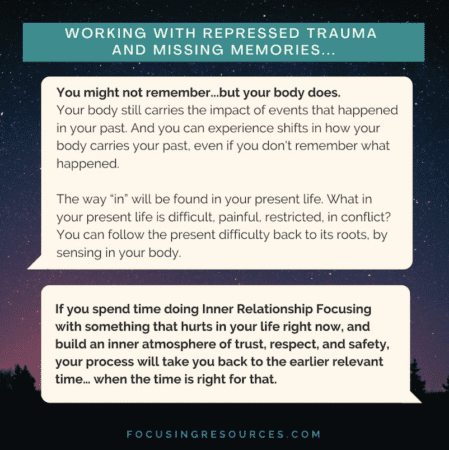~~~~~~~~~~~~~~~~~~~~~~~~~~~~~~~~~~~~~~~~~~~~~~~~
Marti
asks: "My question is about cancer. We still don't know for sure what
causes cancer – whether it might be from something outside ourselves
like a virus, or whether it's our own cells gone amok. So far, it seems
to be our own cells, turned against us, trying to kill us. Most
approaches to cancer use chemotherapy, drugs exterior to our own
systems, to enter and try to kill off the cancer cells. Some drug
therapies try to strengthen our own white blood cells to fight the
cancer. At any rate, the approach is trying to kill these cells that
are trying to kill us. But if they are our own cells, then wouldn't it
seem a wrong approach to try to fight and kill our own cells? Wouldn't
the approach of Focusing be different – to try to dialogue with them
and find out why they are intent on killing us?"
Dear Marti,
I can't say I know a lot about this topic – although I have lost a brother and a sister to cancer. Let me just say what comes.
When
you say that cancerous cells are "intent on killing us," that doesn't
resonate for me. If cancer is from a virus, well, viruses just want to
reproduce themselves. I don't get the "they want to kill us" thing.
They want to live, themselves. Or if it's cells of our body "run amok,"
I wouldn't want to make any assumptions about why they are doing that.
So that might be the first shift in attitude, to an empathy to what
they actually might be trying to do.
We've all heard of Carl
Simonton, who pioneered the notion that one's state of mind could
influence one's ability to survive cancer. Simonton is perhaps best
known for his imagery techniques that cancer patients can use as an
adjunct to chemotherapy. Some of them involved imagining gunning down
the cancerous cells with machine guns. But he tailored the imagery to
the person, and suggested that if violence didn't fit, try imagining
gently harvesting the cells instead.
(According to his online bio, Simonton
is still going strong, still pioneering in the area of quality of life
and emotional support as a primary approach to cancer treatment. It's
much more than just the imagery techniques.)
If one chooses
chemotherapy as an approach to one's cancer treatment, then it may make
sense to use imagery techniques to support what the chemo is doing – in
a way that feels consistent with one's own values. But there are other
ways to use Focusing with cancer.
Finding the healing energy within
When I was writing The Power of Focusing,
my friend Christina Rex told me a story of how she had used Focusing to
support cancer treatment. She had arranged a Focusing session with a
partner to take place right before the first radiation treatment…
assuming that she would find parts of her feeling afraid that needed
her to listen.
In fact she found no fear. Instead there was
light lively energy, what felt like healing energy, flowing throughout
her body. She enjoyed and received it, and the healing from both the
treatment and the cancer proceeded beautifully.
My sister used
Focusing to help feel the rightness of different chemo treatments, to
help make decisions, and also to sense when she needed to rest and when
it was OK to have an active day. She had two active years being with
her family and completing her work, even with a pretty serious cancer.
What I love about Focusing is that it helps you sense what is right for you.






